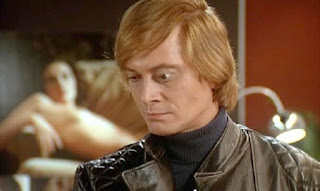Directed
by Henri Verneuil; produced by Jean-Paul Belmondo
A
killer calling himself Minos (Adalberto-Maria Merli) is on the loose in Paris,
first tormenting women with nightly telephone calls, and then killing them for
their alleged depravity. Put on the case is Commissar Letellier (Jean-Paul
Belmondo) and his team. Complicating the case is Letellier’s obsession with
capturing a bank robber (Giovanni Cianfriglia), whose earlier escape led to the
police officer’s disgrace. Despite Letellier’s lukewarm initial interest in
Minos, he is soon determined to bring the murderer to justice.
In
1970s France, there was no more popular actor than Jean-Paul Belmondo and in
this, one of his most popular movies, he shows why. Teamed with a director with
whom he had worked previously, he produces a movie that, despite flaws, is an entertaining
crime thriller with elements of American film noir and Italian giallo genres.
The
story is probably the weakest aspect of Peur
sur la Ville. It’s an ordinary tale of a lunatic on a spree, daring the
police to catch him. Letellier’s character is the hard-driving, hard-boiled cop
seen in about a thousand similar films, though, with a characteristically
French take on the stereotype, Belmondo plays him as both almost light-hearted
and dismissive, cynical and dedicated. In many respects, though, viewers will
see very familiar traits, and nothing in the way of originality.
The
script, by the director, is rather better than the story. Unlike some American
films of the decade, the protagonist breaks the rules but does not show
disrespect toward his superiors; indeed, his immediate chief (Jean Martin) is
sharp, and knows how to push Letellier’s buttons to get him to do what is
needed. There is no great trauma in the hero’s past that has damaged him, just
dissatisfaction at his job prospects. Unusually, there is no love-interest; not
quite.
The
direction is good - very good in action
sequences – but seems almost as if it needed refinement or, perhaps, better
editing. There is a relatively extended radio interview which is seen to
provoke the killer to anger, but is too long and, really, unnecessary. The best
sequence, a long pursuit, which becomes another
pursuit, is by far the most exciting part of the film, and should have been
worked into the climax. There are some memorable images, though, such as a
deadly game of hide-and-seek among mannequins.
Though
it would be inaccurate to write that Belmondo is the movie, or that another
actor could not have been cast, he nevertheless brings a presence to the film
that is compelling. He is very watchable. Certainly not conventionally handsome
– as Humphrey Bogart was not – he manages to be convincingly attractive to
women while likeable, or at least comradely, to men. Then there are the stunts.
Belmondo performed his own, and these make the action sequences worth seeing.
He dangles from a helicopter, drives a car from its passenger seat, runs along
the roof of a speeding subway train and, in a scene that will make many palms
sweat, chases the villain along roof-tops.
The music is a successful aspect of Peur sur la Ville. Composed by Ennio Morricone, it provides at times a driving pulse, at other times a discordant anxiety. I found it in way similar to his later score for The Untouchables. There
are smaller items of interest, such as the differences between police procedure
here and in American and British films. Instead of a partnership of two
detectives, Lettelier leads a team (‘brigade’), though he works most closely
with his deputy (Charles Denner). Watching Peur
sur la Ville in French (a foreign film should never be seen in a dubbed
version), one learns that Parisian junior police detectives called their chief ‘patron’.
The City of Lights usually provides an excellent setting for a film, and this
one is no different, though I have yet to determine whether one can see the
Eiffel Tower from almost anywhere in Paris, or if the shots were decided by the
availability of that background.
Peur sur la Ville has
problems, some of which may not be such to French audiences, but is for the
most part an involving police action flick starring an actor at the height of
his career.








You done it again John...
ReplyDeleteJust found said film on eBay...$10.89..
Send link to my daughter..so, should get
it early next week..
One thing for me is Ennio Morricone...
Since 1961, Morricone has composed over 400
scores for cinema and television, as well as
over 100 classical works...
And still with us to~day..and still plays the
trumpet..aged 91..! :)
Four hundred! I had no idea Morricone was so prolific. He’s like the baroque and classical musicians who composed hundreds of works, dozens of operas in their lifetimes.
DeleteMy favourite has always been his score for
DeleteSergio Leone's 'Once Upon a Time in the West'
and is one of the top 5 best-selling original
instrumental scores in the world today, with
about 10 million copies sold...
Oh! And of course..'The Good, The Bad and the
Ugly'...or as l prefer to call it...
'Il Buono, il Brutto, il Cattivo'
He's had an amazing career. Probably anyone who's been to the movies or watched TV has heard his music.
Delete